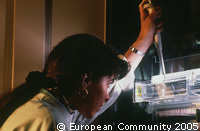Commission launches public consultation on European Institute of Technology
A public consultation on whether and how to create a European Institute of Technology (EIT) was opened by the European Commission on 16 September. The consultation seeks to gather the views of stakeholders on how an EIT could strengthen research and education, as well as market innovation in Europe. The public consultation will run until mid-November, and will feed into a wider analysis being carried out by the European Commission services. The idea of establishing an EIT, inspired by the Massachusetts Institute of Technology (MIT) in the US, was launched by the President of the European Commission, Jose Manuel Barroso, in February 2005. The Commission's mid-term review of the Lisbon process, COM (2005) 24, says that 'the Commission proposes the creation of a 'European Institute of Technology' to act as a pole of attraction for the very best minds, ideas and companies from around the World. The Commission will actively explore with the Member States and public and private stakeholders on how best to take this idea forward.' The idea of establishing an EIT was particularly welcomed by the Campaign for Parliament Reform (CPR), a cross party group of 130 MEPs from 15 member states, which called for the institute to be housed in the current European Parliament buildings in Strasbourg. According to the CPR, the money saved by putting an end to Parliament meetings in Strasbourg - almost 200 million euro per year - could be well invested in Europe's future, through this flagship European university with 'the best facilities in the world'. At the end of March, the European Commission published an information note outlining its initial thoughts on the establishment of a European Institute of Technology (EIT), arguing that a network of existing institutions would be preferable to the creation of a new one. The proposal was received with concern by the European Research Advisory Board (EURAB), which expressed doubts over the Commission's plans, warning that such 'top down' initiatives rarely work. Moreover, EURAB expressed its fear that talk of creating an EIT could undermine preparations for the European Research Council (ERC). Ján Figel, European Commissioner in charge of Education, Training, Culture & Multilingualism said that 'a European Institute of Technology could play an innovative role in supporting knowledge transfer, attracting the best researchers and companies from around the world to work in partnership'. Such an EIT should draw on the considerable strengths of existing European institutions, he added. On 16 September President Barroso welcomed the public consultation, saying: 'Together we need to strengthen Europe's potential in research and technology, by stimulating research careers, by encouraging European researchers to stay in Europe and by attracting the best brains from around the world to Europe.' The Commission describes itself as being 'still very much in listening mode on this issue'. The public consultation will focus on 'first order' issues: the EIT's key missions, objectives, added-value and possible structure. An online questionnaire, available on the Europa website, asks for views on how the EIT could best organise its activities in order to support innovation and the transfer of knowledge throughout the EU. Once the consultation is concluded, the Commission will consider whether it wishes to take the matter further, and may then prepare a paper for the Spring European Council in March 2006. If the idea of the establishment of an EIT were to be approved by the European Council, the Commission would make a formal legislative proposal to the Council and the European Parliament.

